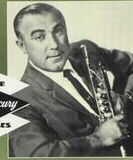
Ralph Marterie
| The Creep | |
| Skokiaan |
One of the last big-band leaders to enjoy consistent commercial success, trumpeter Ralph Marterie had a number of hits for Mercury in the early and mid-'50s. While he could play swing when the occasion was suitable, Marterie was not, nor did he pretend to be, a jazzman. Artistic statements were not on the agenda he played a wide variety of instrumental
orchestral pop that mainstream listeners wanted to hear. Next to him, Glenn Miller sounded downright tough. To subsequent generations, that means that Marterie's hits sound much like the kind of music churned out by television orchestras in the 1950s.
There's always been a market for music that aspires to do nothing more than entertain, though, and Marterie certainly was willing and able to do what was necessary to deliver the goods on that score. Lush pop ballads, some Italian pop and middle eastern influences, novelties, swing, even a rock & roll cover Marterie had success with all of these approaches.
Emigrating from Italy to Chicago as a young boy, Marterie began playing professionally in his teens. Through the 1930s and '40s he took a lot of radio work, sometimes as a member of the NBC orchestra, where he played with conductors like Percy Faith and Andre Kostelanetz. Signed to Mercury in 1949, he not only recorded for that label as an artist, but led studio bands that backed such Mercury acts as Vic Damone and the Crew Cuts. Between 1952 and 1957 he had a number of big singles; "Pretend," a cover of Duke Ellington's "Caravan," and "Skokiaan" all made the Top Ten.
Much of his material was precisely the kind of innocuous pop instrumentals that rock & roll blew out of the water, yet Marterie was one of the first mainstream musicians to cover a rock & roll song. His cover of Bill Haley's "Crazy Man Crazy" (itself one of the first rock & roll records to make the Top 20) made number 13 in 1953.
Earlier, Marterie actually had a small hit with a cover of a Woody Guthrie tune, "So Long (It's Been Good to Know Ya)." Isolated sides like "Bumble Boogie" proved that he could swing respectably when the mood took him, but Marterie generally stuck to a placid groove, despite the presence of electric guitar on sides like "Caravan."
As rock & roll gained steam, the trumpeter actually added some basic R&B motifs on "Tricky" in 1957, resulting in a Top 30 hit; the same year, "Shish-Kebab," with its twangy pre-surf guitar lines and snake charmer melody, gave him his last Top Ten hit.